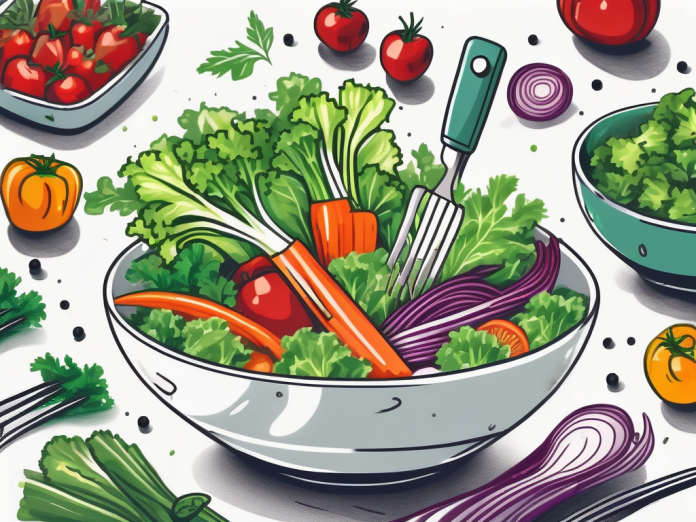Are you looking to improve your overall health and feel better in your own skin? One simple way to achieve these goals is by transforming your diet and incorporating more vegetables into your meals. Vegetables are packed with essential nutrients, vitamins, and minerals that are vital for the proper functioning of your body. In this article, we will explore the importance of vegetables in your diet, identify common barriers to eating more vegetables, discuss simple strategies to incorporate them into your meals, and provide tips for maintaining a vegetable-rich diet. So, let’s dive in and discover how you can easily add more vegetables to your daily routine!
Understanding the Importance of Vegetables in Your Diet
When it comes to a healthy diet, vegetables should play a starring role. They are low in calories and high in fiber, making them excellent for weight management. Additionally, vegetables provide an array of essential nutrients, including vitamins A, C, and potassium, which are crucial for maintaining a healthy immune system and vibrant skin. They are also rich in antioxidants, which help combat free radicals and reduce the risk of chronic diseases such as heart disease and certain types of cancer.
Nutritional Value of Vegetables
Vegetables are a nutritional powerhouse. They contain a wide range of vitamins, minerals, and dietary fiber that are necessary for good health. Some vegetables, such as leafy greens like kale and spinach, are particularly nutrient-dense, packing a punch of vitamins A, C, and K, as well as calcium and iron. Others, like bell peppers and tomatoes, are rich in vitamin C and antioxidants. By including a variety of vegetables in your meals, you can ensure you’re getting a wide spectrum of nutrients to support your body’s needs.
Health Benefits of Regular Vegetable Consumption
Regularly consuming vegetables can have numerous health benefits. Their high fiber content promotes healthy digestion, keeps you feeling full for longer periods, and aids in maintaining a healthy weight. The antioxidants found in vegetables help reduce inflammation in the body and protect against chronic diseases. Plus, the vitamins and minerals present in vegetables support various bodily functions, from boosting your immune system to promoting healthy hair and skin.
Identifying Barriers to Eating More Vegetables
Despite the undeniable benefits of vegetables, many people struggle to incorporate them into their diet. Let’s explore some common barriers and how you can overcome them.
Common Misconceptions About Vegetables
One of the main barriers to eating more vegetables is the misconception that they are tasteless or boring. However, this couldn’t be further from the truth. Vegetables can be incredibly versatile and delicious, especially when prepared with flavorful spices and combined with other ingredients. It’s all about finding the right recipes and cooking techniques that suit your taste preferences.
Overcoming Taste and Texture Preferences
Another common barrier is an aversion to certain vegetable tastes or textures. If you find yourself not enjoying particular vegetables, don’t worry – there are plenty of ways to overcome this. Experiment with different cooking methods like roasting or grilling to bring out new flavors and textures. You can also try blending vegetables into smoothies or soups to make them more palatable. Don’t be afraid to give vegetables a second chance and explore different varieties to find the ones you enjoy the most.
Simple Strategies to Incorporate More Vegetables
Now that we’ve addressed some common barriers, let’s explore some simple strategies to incorporate more vegetables into your meals effortlessly.
Making Vegetables a Main Dish
One way to ensure you’re getting enough vegetables is by making them the star of your meals. Instead of sidelining them as a mere side dish, create meals that revolve around vegetables. For example, whip up a colorful stir-fry with an array of veggies like bell peppers, broccoli, and snap peas. Another option is to make vegetable-based soups or salads that are both nutritious and filling.
Sneaking Vegetables into Your Favorite Meals
If you or your family members are picky eaters when it comes to vegetables, sneaking them into familiar dishes can be a game-changer. Grate zucchini or carrots and mix them into meatballs or meatloaf. Puree cauliflower or butternut squash and add them to macaroni and cheese. You’ll be surprised by how easily you can incorporate vegetables into your favorite recipes without sacrificing taste or texture.
Exploring a Variety of Vegetables
Are you tired of always reaching for the same vegetables? It’s time to broaden your horizons and discover new flavors and textures!
Discovering Less Common Vegetables
There is an incredible variety of vegetables out there that often go overlooked. Take a trip to your local farmer’s market or grocery store and try something new. Experiment with vegetables like kohlrabi, bok choy, or watercress to add excitement and diversity to your meals. You may find a new favorite that you never knew existed!
Seasonal Vegetables and Their Benefits
Eating seasonally has many advantages, both for your health and the environment. Seasonal vegetables are usually fresher, tastier, and more affordable. They also support local farmers and reduce the carbon footprint associated with long-distance transportation. Do a quick search for what’s in season in your area and plan your meals accordingly. Not only will you be adding variety, but you’ll also be enjoying the best flavors each season has to offer!
Maintaining a Vegetable-Rich Diet
Incorporating more vegetables into your diet is not just a one-time effort – it’s a lifestyle change. Here are some tips to help you maintain a vegetable-rich diet long-term.
Planning and Preparing Vegetable-Forward Meals
Plan your meals around vegetables to ensure they take center stage. Create a weekly meal plan, making sure to include a variety of vegetables in each meal. Prepare your vegetables in advance by washing, chopping, and storing them in the fridge so they’re readily available when you need them. With a little bit of planning and preparation, eating vegetables will become second nature.
Staying Motivated in Your Vegetable Journey
Staying motivated is key to any successful change in your diet. Remind yourself of the numerous health benefits you’ll be gaining by incorporating more vegetables into your meals. Try new recipes regularly to keep your taste buds excited. You can even involve your family or friends and make it a fun, healthy cooking adventure. Celebrate your progress and newfound love for vegetables along the way!
By following these simple strategies and incorporating more vegetables into your diet, you’ll be well on your way to transforming your health and well-being. Remember, small changes can lead to significant results. So, start today and savor the delicious flavors and nourishing benefits that vegetables have to offer!




























